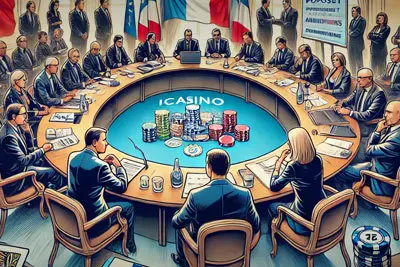
Economic and Health Arguments for Legalization
Proponents of online casino legalization argue that the current prohibition places France at odds with EU standards, as it remains one of only two EU countries, alongside Cyprus, to ban online casino gambling. Despite this, France already allows online betting and poker, with poker being categorized as a skill-based game and thus exempt from the ban on games of chance.
Advocates of the proposed legislation believe that regulating online casinos would enable the government to generate substantial tax revenue and better manage public health risks by overseeing the sector. Government estimates suggest that legalizing online casinos could yield up to €1 billion in taxes annually, with a projected gross gaming revenue (GGR) tax of 55.6%, aligning with the rate applied to online lottery games.
The illegal online casino market in France is reportedly thriving, with the government estimating annual revenues from unregulated operations reaching as much as €1.5 billion. By bringing these activities into a legal framework, officials argue, they could address health concerns more effectively. The government stated that regulated online casinos could “limit the impact of online games on the health of consumers” and reduce the appeal of unlicensed operators.
Strong Opposition from Addiction Specialists and Casino Industry
Despite these proposed benefits, the plan has faced substantial resistance from those concerned about public health and the livelihood of France’s physical casinos. Féderation Addiction, a coalition of addiction specialists, warned against the amendment, labeling it “irresponsible and contrary to public health priorities.” Citing statistics from 2019, the organization highlighted that 1.4 million people in France were already at risk of excessive gambling, with nearly 400,000 dealing with severe gambling addiction. They cautioned that legalizing online casinos could exacerbate these issues, with more individuals potentially developing problematic gambling behaviors.
France’s land-based casino industry also voiced strong concerns, citing potential economic damage. The president of Casinos de France, Grégory Rabuel, expressed alarm over the projected consequences for physical casino venues. In a statement, Rabuel noted that “opening up online casinos will lead to a fall in gross gaming revenue for land-based casinos of between 20% and 30%.” He also warned that up to 30% of establishments could face closure, threatening around 15,000 jobs. This sentiment was echoed by over 130 French mayors in an editorial published in Le Figaro, where they argued that legalizing online casinos would ultimately harm the industry rather than boost the state’s finances, describing the proposal as “opening a Pandora’s box.”
Postponement and Future Considerations
In response to these concerns, Minister Saint-Martin confirmed that the amendment to legalize online casinos would be removed from the 2025 budget proposal, stating, “We need to work among ourselves first.” He emphasized the government’s commitment to considering all parties involved, especially land-based casinos. This delay maintains the current regulatory framework established in 2010, which allows for sports betting, horseracing, and poker but excludes online casinos.
However, the government has not entirely abandoned the idea. Saint-Martin indicated that future discussions may revisit online casino legalization, with potential legislative measures addressing tax generation, protections for physical casinos, and public health safeguards. Casino representatives, for their part, remain cautious but are prepared to engage in constructive discussions. Rabuel expressed relief over the postponement and emphasized the importance of a collaborative approach: “We remain vigilant to ensure that any future legislative or regulatory changes take place within a framework of consultation and constructive dialogue.”
As the debate continues, the French government’s approach will likely focus on balancing economic incentives with the need to protect public health and safeguard the interests of the country’s established casino sector. The final decision, expected after thorough consultations, will determine whether France joins the majority of EU countries in permitting online casinos or continues to uphold one of the EU’s most restrictive gambling regulations.
Sources:
“Plans to legalise online casinos in France met with opposition“, rfi.fr, October 23, 2024.




